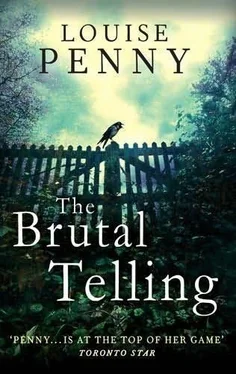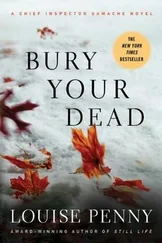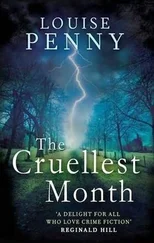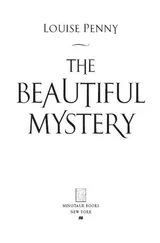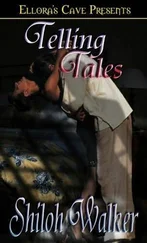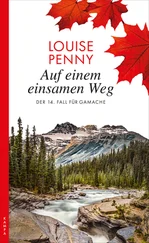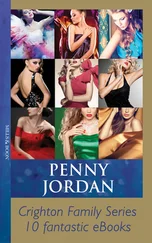Ten to four. The heavy traffic out of the city was thinning. They’d be home in an hour. If they got back before five she could call his gallery and prostrate herself.
Or maybe she should call and tell him what an asshole he was.
It was a very long drive back.
“Do you want to talk about it?” Gamache asked after half an hour of silence. They’d turned off the highway and were heading toward Cowansville.
“I’m not really sure what to say. Denis Fortin called Gabri a fucking queer yesterday in the bistro. Gabri didn’t hear it, but I did, and I didn’t say anything. I talked to Peter and Myrna about it, and they listened, but they pretty much left it up to me. Until this morning when Peter kinda said I should talk to Fortin.”
Gamache turned off the main road. The businesses and homes receded and the forest closed in.
“How did Fortin react?” he asked.
“He said he’d cancel the show.”
Gamache sighed. “I’m sorry about that, Clara.”
He glanced over at her unhappy face staring out the window. She reminded him of his daughter Annie the other night. A weary lion.
“How was your day?” she asked. They were on the dirt road now, bumping along. It was a road not used by many. Mostly just by people who knew where they were going, or had completely lost their way.
“Productive, I think. I have a question for you.”
“Ask away.” She seemed relieved to have something else to do besides watching the clock click closer to five.
“What do you know about Emily Carr?”
“Now, I’d never have bet that was the question,” she smiled, then gathered her thoughts. “We studied her in art school. She was a huge inspiration to lots of Canadian artists, certainly the women. She inspired me.”
“How?”
“She went into the wilderness where no one else dared to go, with just her easel.”
“And her monkey.”
“Is that a euphemism, Chief Inspector?”
Gamache laughed. “No. Go on.”
“Well, she was just very independent. And her work evolved. At first it was representational. A tree was a tree, a house a house. It was almost a documentary. She wanted to capture the Haida, you know, in their villages, before they were destroyed.”
“Most of her work was on the Queen Charlotte Islands, I understand.”
“Many of her most famous works are, yes. At some point she realized that painting exactly what could be seen wasn’t enough. So she really let go, dropped all the conventions, and painted not just what she saw, but what she felt. She was ridiculed for it. Ironically those are now her most famous works.”
Gamache nodded, remembering the totem poles in front of the swirling, vibrant forest. “Remarkable woman.”
“I think it all started with the brutal telling,” said Clara.
“The what?”
“The brutal telling. It’s become quite well known in artistic circles. She was the youngest of five daughters and very close to her father. It was apparently a wonderful relationship. Nothing to suggest it wasn’t simply loving and supportive.”
“Nothing sexual, you mean.”
“No, just a close father-daughter bond. And then in her late teens something happened and she left home. She never spoke to him or saw him again.”
“What happened?” Gamache was slowing the car. Clara noticed this, and watched the clock approaching five to five.
“No one knew. She never told anyone, and her family said nothing. But she went from being a happy, carefree child to an embittered woman. Very solitary, not very likeable apparently. Then, near the end of her life, she wrote to a friend. In the letter she said that her father had said something to her. Something horrible and unforgivable.”
“The brutal telling.”
“That’s how she described it.”
They’d arrived. He stopped in front of her home and they sat there quietly for a moment. It was five past five. Too late. She could try, but knew Fortin wouldn’t answer.
“Thank you,” he said. “You’ve been very helpful.”
“And so have you.”
“I wish that was true.” He smiled at her. But, remarkably, she seemed to be feeling better. Clara got out of the car, and instead of going inside she paused on the road then slowly started to walk. Around the village green. Round and round she strolled, until the end met the beginning and she was back where she started. And as she walked she thought about Emily Carr. And the ridicule she’d endured at the hands of gallery owners, critics, a public too afraid to go where she wanted to take them.
Deeper. Deeper into the wilderness.
Then Clara went home.
It was late at night in Zurich when an art collector picked up the odd little carving he’d paid so much for. The one he’d been assured was a great work of art, but more important, a great investment.
At first he’d displayed it in his home, until his wife had asked him to move it. Away. So he’d put in into his private gallery. Once a day he’d sit in there with a cognac, and look at the masterpieces. The Picassos, the Rodins and Henry Moores.
But his eyes kept going back to the jolly little carving, of the forest, and the happy people building a village. At first it had given him pleasure, but now he found it spooky. He was considering putting it somewhere else again. A closet perhaps.
When the broker had called earlier in the day and asked if he’d consider sending it back to Canada for a police investigation he’d refused. It was an investment, after all. And there was no way he could be forced. He’d done nothing wrong and they had no jurisdiction.
The broker, though, had passed on two requests from the police. He knew the answer to the first, but still he picked up the carving and looked at its smooth base. No letters, no signature. Nothing. But the other question just sounded ridiculous. Still, he’d tried. He was just about to replace the carving and e-mail that he’d found nothing when his eyes caught something light among the dark pines.
He peered closer. There, deep in the forest, away from the village, he found what the police were looking for.
A tiny wooden figure. A young man, not much more than a boy, hiding in the woods.
THIRTY-ONE


It was getting late. Agent Lacoste had left and Inspector Beauvoir and Agent Morin were reporting on their day.
“We checked into the Parras, the Kmeniks, the Mackus. All the Czech community,” said Beauvoir. “Nothing. No one knew the Hermit, no one saw him. They’d all heard of that violinist guy—”
“Martinù,” said Morin.
“—because he’s some famous Czech composer, but no one actually knew him.”
“I spoke to the Martinù Institute and did background checks on the Czech families,” said Morin. “They’re what they claim to be. Refugees from the communists. Nothing more. In fact, they seem more law-abiding than most. No connection at all with Martinù.”
Beauvoir shook his head. If lies annoyed the Inspector the truth seemed to piss him off even more. Especially when it was inconvenient.
“Your impression?” Gamache asked Agent Morin, who glanced at Inspector Beauvoir before answering.
“I think the violin and the music have nothing to do with the people here.”
“You may be right,” conceded Gamache, who knew they’d have to look into many empty caves before they found their killer. Perhaps this was one. “And the Parras?” he asked, though he knew the answer. If there’d been anything there Beauvoir would have told him already.
“Nothing in their background,” Beauvoir confirmed. “But . . .”
Читать дальше
